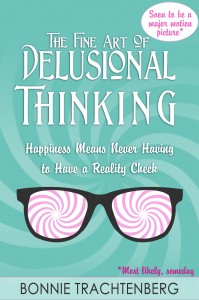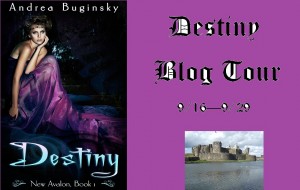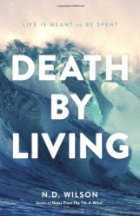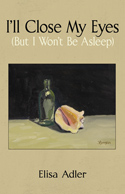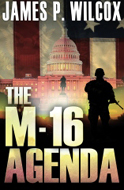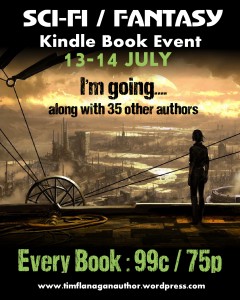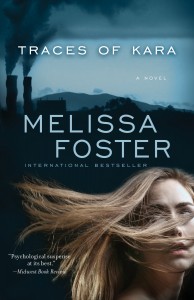Romantic-comedy writer and humorist, Bonnie Trachtenberg, joins us today to discuss her latest, The Fine Art of Delusional Thinking: Happiness Means Never Having to Have a Reality Check. In a spoof on self-help books extolling the “Laws of Attraction,” The Fine Art of Delusional Thinking is a funny, satirical book that teaches readers how to delude themselves to a happier life. As she has said, “I think it will appeal to an awful lot of people, because aren’t we all a little delusional sometimes?” Without further ado, please welcome Bonnie Trachtenberg!
Silverberry: You’ve packed a wealth of wild experiences, colorful people, and nutty behavior into your life, which you’ve said inspired The Fine Art of Delusional Thinking. Tell us about some of them.
Trachtenberg: Ha! Each story could be its own book, but suffice it to say that Los Angeles is filled with people who migrate there from all parts of the country and the world, in search of glamour, fame, and excitement. Many have stars in their eyes; I was one of them. Therefore, I attracted many friends and acquaintances with similar interests, dreams, and desires—people who happen to make good characters for fiction, as my two novels prove! But some of us took the search to extremes, and so wild stories ensued, many of which are depicted in this book.
Silverberry: What are the Five Fundamentals of Fantasy?
Trachtenberg: I begin the book by outlining The Five Fundamentals of Fantasy, which are five basic rules that form the foundation of delusional behavior. They are “critical” in helping budding Delusionals survive in an often-dismal world.
Silverberry: Obviously, you’re spoofing, but is there usefulness in having a bit of delusional thinking to get us through?
Trachtenberg: If it’s infused with humor and the ability to laugh at our own human nature, then definitely yes. This book, I realized, is the perfect spoof on all the laws of attraction books that have exploded in recent years. It just takes the idea to absurd (and hilarious) levels.
Silverberry: It seems to me that comedy, satire, and parody are some of the hardest things to write. How in the world do you do it?
Trachtenberg: That’s a tough one to answer because this book just spilled out of me as if the Delusional in me could not be denied! I really didn’t set out to write a satire or parody, and I’ve never written one before this, so I was surprised, too. As far as comedy is concerned, all my books have humor in them and I’m fortunate that wit comes naturally to me. I love looking at the humorous side of life, especially through the eyes of my characters.
Silverberry: I read recently that movie studios are making far fewer romantic comedies because they don’t do as well in the box office as suspense and thrillers. Do you think that’s happening with novels, too? Why do you think the public has veered away from comedy?
Trachtenberg: Yes, I read that, too, and it caused quite a stir in my Chick Lit/romance group! What we collectively concluded, is that if Hollywood paid as much attention to their writers and scripts, as they do their blood, gore, and car crashes, people would still be going to the movies in droves for romantic comedies. The problem is that most of what they’ve been putting out now is pretty lousy in comparison to the great romantic comedies of years past. The relationships are more about sex than about watching two funny and endearing characters fall in love with each other. If Harry met Sally now, I can assure you they’d do great box office, because word of mouth is what gets people to go to the movies, and most everyone adored that movie. Nora Ephron’s script was a masterpiece. It featured the comedic talents of Billy Crystal, Meg Ryan, and Carrie Fisher. Nowadays I personally don’t think anything has come even close since “Something’s Gotta Give” ten years ago! As for novels, I’m happy to say the romantic book industry is booming in all its forms. Hmmm…maybe the movie studios should make a note of that.
Silverberry: Tell us about your other books!
Trachtenberg: My debut novel, Wedlocked, is the story of a single, 36-year-old aspiring actress who, after many of life’s hard knocks, impulsively marries into a disastrous marriage. It is based on my own first, brief marriage, and although it was hardly funny to me back then, I’m so glad I was able to turn it into a romantic comedy for others to enjoy. Interestingly, it’s the true things I wrote about that most people think I made up!
My second novel, Neurotically Yours, is less biographical, but still based on my dating experiences. Like me, the main character is an advice columnist, but her other experiences, friends, and relationships are mostly fictional. In it, she and her lovable friend, Reggie, decide to open up a dating service for the perennially single and the romantically challenged. Needless to say I had a lot of fun with this one!
I’m happy to declare that both books are multi-award-winners and bestsellers—more proof that the romantic book industry is alive and well! Oh and by the way, I can’t tell you how many people have remarked they are perfect for the big screen. Hear that Hollywood?
Silverberry: What’s coming up for you?!
Trachtenberg: I’m presently working on my third novel. It’s about a successful, ambitious, and driven party planner in New York, who finds her life suddenly upended after a near death experience. Yes, there is romance in this one, too. Although the story may be a little less geared for comedy than the others, it makes up for it in intrigue and plot twists. Stay tuned!
Silverberry: Thanks so much for stopping by, Bonnie! Readers can follow you and purchase The Fine Art of Delusional Thinking and your other books at the links below.
Learn much more about Bonnie at her Website
Read her Advice Column
Find her on Facebook
Follow her on Twitter: @Writebrainedny
Buy The Fine Art of Delusional Thinking
Buy Wedlocked!
Buy Neurotically Yours
BIO:
Bonnie Trachtenberg is the multi-award-winning, bestselling author of Wedlocked: A Novel, Neurotically Yours: A Novel, and The Fine Art of Delusional Thinking. She writes a monthly relationship and advice column for Love a Happy Ending Lifestyle Magazine. Bonnie was senior writer and copy chief at Book-of-the-Month Club and has written seven children’s book adaptations. She has also written for three newspapers and penned countless magazine articles. She lives in New York with her husband, four cats, and a dog.
